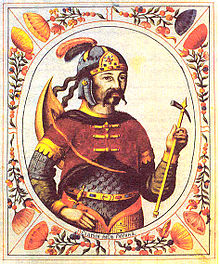The Rise of Russia
Rurik the Rus-
- Viking soldier from Scandinavia, who was invited in[to Russia] by the fighting Slavs (Someone from Russia).

Regions
edit- Steppe- Vast grasslands, few trees, dry w/heavy snow and harsh winds.
- Taiga- Enormous evergreen forests.
Trade
editKievan Rus traded with Byzantium
- Exported honey, wood, fur, salt and iron
- Traders and missionaries brought Orthodox Christianity
How did trade impact Kiev?
- Kiev is a city on the Dneiper River. It helped Russia control trade routes between the Black and Baltic Seas. Kiev dominated water trade and had access to many other civilizations.
Religion
editVladmir I [who is the Constantine of Russia]- First Russian leader to convert to Orthodoxy. He ordered his people to convert as well, but some people did not listen.
Religious themes dominated Russian culture (art, literature, monasteries, etc.)
Rise of Moscow
editAt first, Moscow was a small, little town with a great location. As near vital land and water routes (Black/Baltic Seas, Volga and Dnieper Rivers). The princes of Moscow are known as Muscovy. They expanded their land (Moscow's land) through marriage and wars.
Ivan the Great- united Russia by expelling the Mongols. He married the niece of the last Byzantine Emperor and took the title of "czar", which was used by both Roman and Byzantine rulers. He became Sovereign of All Russia in 1493.
Ivan the Terrible- Cruel ruler (killed his pregnant daughter-in-law and son).
Another Rome!
editThat's right, another name for Moscow is "3rd Rome." It was the center of the Eastern (AKA Greek) Orthodox Church.
Moscow's Got Style
editEuropean influence reached Russia, but it was transformed by Russia's personal tastes and style.
- Church not Latin or Greek - Conducted in Russian
- The Cyrillic Alphabet was developed to spread religion by St. Cyril in 863
- Unique style of icon painting and building construction
- The Kremlin was a fortress with Onion Domes; today, it is used as a government building